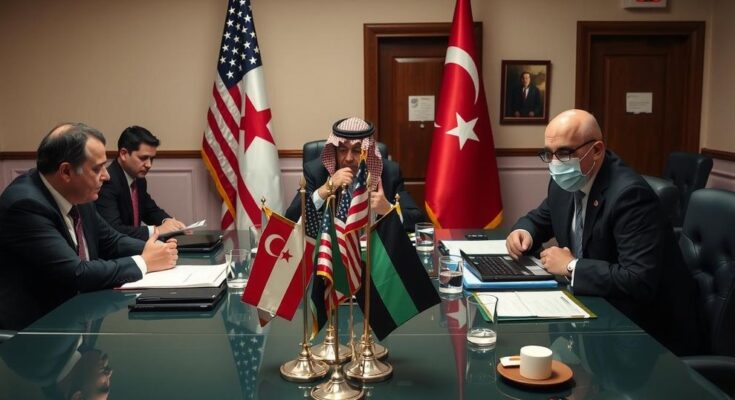Top diplomats from the U.S., Arab League, and Turkey met in Jordan to discuss Syria’s governance post-Assad. Concerns over regional instability and humanitarian crises in Gaza were at the forefront, as U.S. officials stressed the need for an inclusive political process in Syria. Meanwhile, the recent Israeli airstrike in Gaza spotlighted the ongoing humanitarian toll amid conflict.
In a significant diplomatic gathering in Jordan, top diplomats from the United States, the Arab League, and Turkey convened to discuss Syria’s transition following the recent downfall of Bashar Assad’s regime. U.S. Secretary of State Antony Blinken participated alongside foreign ministers from the European Union and the United Nations, aiming to establish a consensus regarding the priorities of Syria’s impending leadership transition. Notably, Syrian representatives were not present at this meeting.
The recent collapse of the Assad regime has ignited concerns over potential instability in a region already reeling from the ongoing Israel-Hamas conflict and tensions involving Hezbollah in Lebanon. Amidst these challenges, the U.S. has recommitted to facilitating a ceasefire in Gaza, where hostilities have led to a dire humanitarian crisis affecting over 2 million Palestinians. According to the Gaza Health Ministry, there have been over 44,800 deaths, predominantly among women and children, amidst ongoing violence.
As hostilities continued, a recent Israeli airstrike in Gaza claimed the lives of at least ten individuals during a targeted municipal meeting. Among the deceased were a mother and her young daughter, underscoring the ongoing civilian toll in the conflict.
In a related development, Turkey took a strategic step by reopening its embassy in Syria, marking the first such move since the regime’s collapse. The embassy’s reopening is significant given Turkey’s historical support for the Syrian insurgents that helped unseat Assad. U.S. Secretary of State Antony Blinken highlighted that there is broad consensus among allies regarding the necessity for Syria’s new government to be inclusive and to uphold the rights of all citizens, specifically emphasizing the rights of women and minorities.
In discussions with U.N. Special Envoy for Syria, Geir Pederson, Blinken noted the importance of establishing a credible political process that encompasses all Syrian communities and urged for the swift provision of humanitarian assistance to prevent institutional collapse. Furthermore, the Jordanian Foreign Ministry underscored the objective of promoting a Syrian-led political process aimed at restoring state institutions and preserving Syria’s unity and territorial integrity.
The geopolitical landscape of the Middle East is undergoing significant transformations following the recent fall of Bashar Assad’s regime in Syria. This development not only alters the internal dynamics of Syria but also has far-reaching implications for regional stability, particularly given the ongoing conflict between Israel and Hamas. The involvement of international diplomatic figures such as those from the U.S., Arab League, and Turkey denotes the urgency and complexity of facilitating a democratic transition in Syria while addressing humanitarian concerns coming from the Gaza conflict. Understanding these contexts is vital for assessing the potential pathways forward for Syria and the region as a whole.
In conclusion, the recent diplomatic discussions in Jordan among U.S., Arab League, and Turkish officials mark a critical step towards establishing a foundation for Syria’s post-Assad governance. The necessity for an inclusive political framework respecting minority rights and humanitarian needs is paramount in this transition. Concurrently, the regional challenges posed by the Gaza conflict highlight the pressing need for coordinated international efforts to achieve stability not only in Syria but also throughout the broader Middle Eastern context.
Original Source: abcnews.go.com




